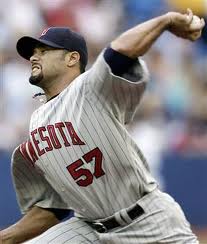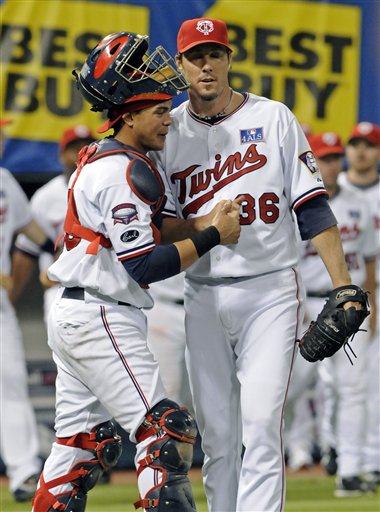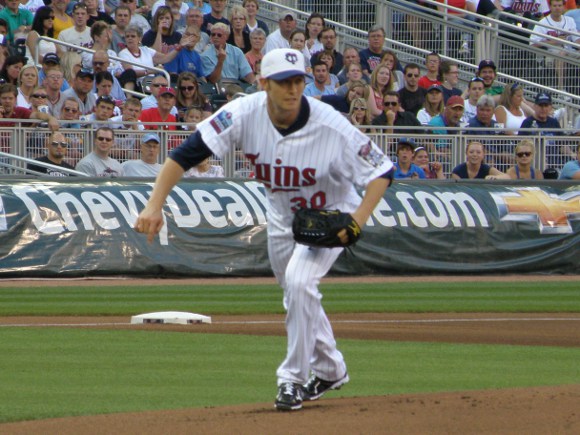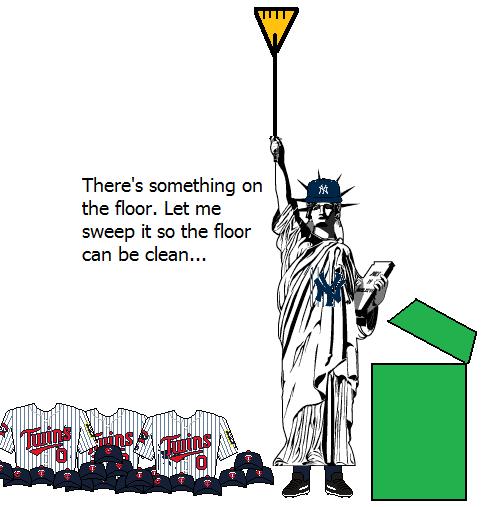The Twins, according to legend, are afraid of the Yankees. And you know what, after some quick post-season exits at the hands of the Yankees, that is a pretty easy narrative to build. Add in the fact that the Twins have struggled to beat the Yankees in the regular season, despite the Twins having fairly successful regular season teams for most of the 2000’s, and you begin to see how that narrative continues to grow.

In the 11 years between 2000 and 2010 the Twins compiled a .537 winning percentage, going 957-826. During that same span the Twins went 25-57 against the New York Yankees, a .325 winning percentage. Take out the 77 games against the Yankees and the Twins are 163 games above .500 instead of just 131. That is a significant bump. During that same time period the Twins played the Yankees four times in the post-season, managing to win just two games, while losing 12, swept in 2009 and 2010. That brings the Twins’ 11-year record against the Yankees to 27-69 (.281). That is bad, almost as bad as the 2003 Detroit Tigers (43-119), the worst team of the last 50 years.
During that same 11-year span the Yankees were 1060-718, only had a losing record against one American League team (Los Angeles Angels of Anaheim, 45-54), and won two World Series titles (and losing in the World Series two other times). So clearly the Yankees were a better team than the Twins over that same time period, but the Yankees’ .596 winning percentage is not so much larger than the Twins’ .537 that you would expect the Twins fail so miserably against the Yankees during the span.
Assuming each team’s regular season winning percentages represented their true talent over those 11 years, the Yankees should have beaten the Twins only about 53% of the time, not the nearly 72% clip they had over that same span. So what gives? Why did the Yankees perform so well against the Minnesota Twins, especially in the post season?
For me, it comes down to roster construction, and specifically the postseason pitching rotations, where teams often turn to only their top three or four pitchers.
2003
| Game (score, winner) | Twins (starting pitcher) | Yankees (starting pitcher) |
| 1 (3-1 Twins) | Johan Santana | Mike Mussina |
| 2 (1-4 Yankees) | Brad Radke | Andy Pettitte |
| 3 (1-3 Yankees) | Kyle Lohse | Roger Clemens |
| 4 (1-8 Yankees) | Johan Santana | David Wells |
The Twins, with a lack of depth in their starting rotation chose to go back to their ace on four days of rest, facing elimination in Game 4. The Yankees, alternatively, felt strong enough to run out David Wells (4.14 ERA, 4.3K/9, essentially a league average pitcher in 2003 despite his 15-7 W/L record) knowing that should they be pushed to a decisive Game 5 they could turn to Mike Mussina, their ace, against Brad Radke (4.49 ERA and a pitch to contact friendly contact rate of 82.2%).
So while you would certainly expect the Twins to score more than 3 runs over their final 3 games in this series, outside of Santana the Twins certainly did not have a rotation that could even dream about keeping up with New York (and remember that the Kyle Lohse of 2003 (4.61 ERA) is a far cry from the pitcher he has been over the past three seasons).
2004
| Game (score, winner) | Twins (starting pitcher) | Yankees (starting pitcher) |
| 1 (2-0 Twins) | Santana | Mussina |
| 2 (6-7 Yankees) | Radke | Jon Lieber |
| 3 (8-4 Yankees) | Carlos Silva | Kevin Brown |
| 4 (5-6 Yankees) | Santana | Javier Vazquez |
The Twins essentially ran the same group of pitchers out there again the following year in 2004, except inserting Silva for Lohse (and Lohse ended up taking the loss in game four, appearing in relief as the game stretched to extra innings). Silva’s 4.21 ERA looks bad against the numbers that pitchers are putting up today, but amidst the steroid era scoring environment and the high-run environment of the Metrodome, it graded out as an ERA+ of 112. Kyle Lohse was really the team’s only other option there, but with an ERA north of 5 that year, he certainly did not look like a postseason starter. The Yankees, on the other hand, had almost a completely new staff. Still anchored by Mike Mussina, this staff had Lieber and Vazquez making one year pitstops in New York, along with Brown who joined the Yankees in the twilight of his 19 year MLB career.

This time the starting pitching was not as big of an issue as the bullpen and a lack of timely hits from the Twins regulars. The Twins won Game 1 on a great performance from Santana, and then proceeded to lose Game 2, and Game 4 in extra innings after subpar performances from the consistently reliable Joe Nathan.
The Twins should have won every game in this series with the exception of Game 3 (which was a blowout until the Twins scored 3 runs in the bottom of the ninth). A little bad luck and some untimely hits cost this team the series, but after a similar result in 2003, that bad luck started to look more like a Twins inability to defeat the Bronx Bombers.
2009
| Game (score, winner) | Twins (starting pitcher) | Yankees (starting pitcher) |
| 1 (2-7 Yankees) | Brian Duensing | CC Sabathia |
| 2 (3-4 Yankees) | Nick Blackburn | A.J. Burnett |
| 3 (1-4 Yankees) | Carl Pavano | Pettitte |
After being swept out of the postseason by the Oakland Athletics in 2006, the Twins stumbled in 2007 and just missed the postseason in 2008 losing game 163, but they were back in the postseason once again in 2009 to take on the Yankees.
My initial thought when looking at the Twins starters: LOLOLOLOLOLOLOLOLOL.

I was going to say that things were probably not as bad as they looked, but Brian Duensing was the Twins’ only starting pitcher with an ERA under 4 (3.64), and he only made nine starts that season (but he was sparkly good as a starter in those 9 games, pitching 52.2 innings to the tune of a 2.73 ERA despite just a 5.6K/9). It seems ridiculous that the Twins started Duensing in Game 1, but the Twins burned Scott Baker in Game 163, along with half of their bullpen, the day before. Still, Blackburn might have been their best option in Game 1, and that alone is laughable in 2013.
This was a Twins team that snuck into the playoffs and faced just about the most lopsided pitching matchups I can imagine. The Twins were at a special disadvantage as Joe Mauer, Denard Span, and Jason Kubel were their main offensive weapons, and as left handed hitters, all were on the wrong side of the platoon against Sabathia and Pettitte.
Hard to imagine the Twins winning a game in their series, even if the two teams were offensively similar (and they were not, the Yankees scored almost 100 more runs than the Twins in 2009). Maybe a little tough luck to be swept, but the Twins had the worst of it in every matchup.
2010
| Game (score, winner) | Twins (starting pitcher) | Yankees (starting pitcher) |
| 1 (4-6 Yankees) | Francisco Liriano | Sabathia |
| 2 (2-5 Yankees) | Pavano | Pettitte |
| 3 (1-6 Yankees) | Duensing | Phil Hughes |
For me, this was probably the most frustrating series against the Yankees. Maybe I do not even have to go that far, Game 1 of this series was probably one of the most frustrating games I have watched as a Twins fan.

The Twins went into this series with the Yankees with home field advantage, playing in front of sold out crowds at brand spankin’ new Target Field. Twins euphoria had likely not been higher since 1991. Liriano was pitching well again (of course he was, it was an even numbered year) and the Twins staked him to an early 3-0 lead and Liriano was cruising through the first five innings. Then in the sixth inning, following a Nick Swisher strike out, Mark Teixeira doubled, and then advanced on a wild pitch. Liriano walked the next batter (Alex Rodriguez) and as a fan you started to get that feeling that the Yankees were going to blow things open. They did. Liriano fell apart and the Yankees grabbed the lead with a four run inning. At that point, just about everyone in Twins territory knew that the game, and ultimately the series, was over (or at least it surely seemed that way).
The Twins once again struggled against left handed pitching and in the final game of the series Brian Duensing could not make it out of the fourth inning and the Twins lost to the Yankees once again.
While I felt cheated in 2004 when the Yankees thoroughly defeated the Twins in the other three post season series, largely because of a lack of starting pitching on the Twins end. Sure, the Yankees had some great arms, but the Twins never had more than one pitcher that might be considered an above average postseason pitcher, and in 2009 they did not have any. Hate on the Yankees all you want, the real culprit here is a lack of starting pitchers.

